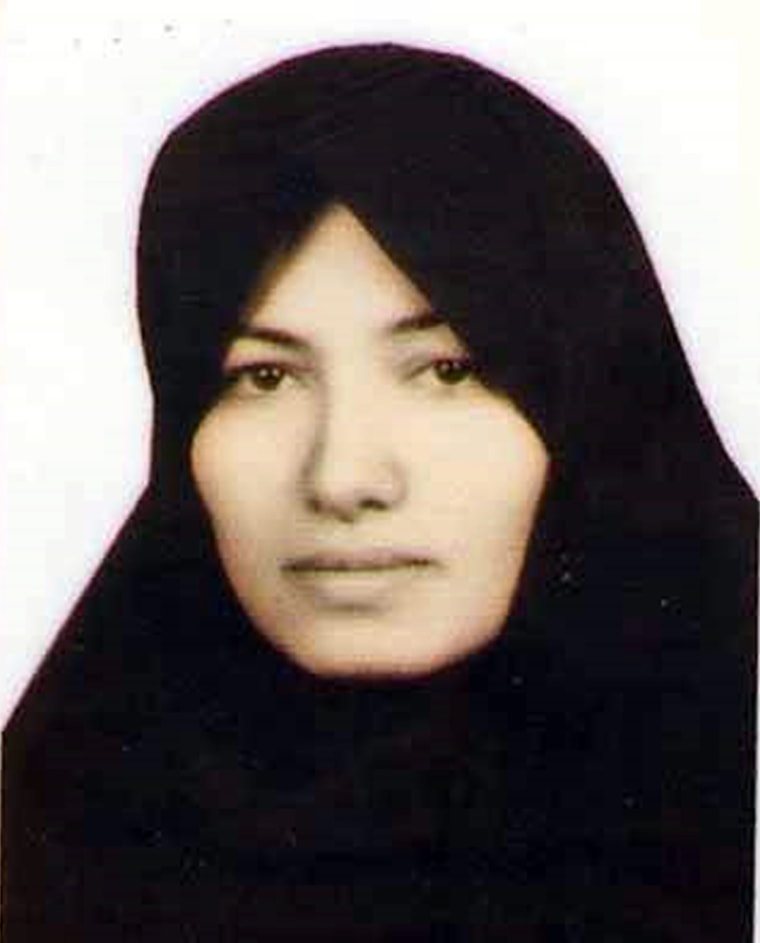The Iranian Embassy in London on Thursday denied reports by media and human rights groups that a convicted adulterer would face death by stoning for her crime.
The execution of Sakineh Mohammadi Ashtiani, 43, who has already spent five years in prison and received 99 lashes for alleged adultery, would "disgust and appall the watching world," the British Government declared, according to a report Thursday in U.K. newspaper The Times.
Later Thursday, the Iranian Embassy took issue with those comments, releasing its own statement that "according to information from the relevant judicial authorities in Iran, she will not be executed by stoning punishment." It was uncertain if Ashtiani would face death by another means.
"It is notable that this kind of punishment has rarely been implemented in Iran and various means and remedies must be probed and exhausted to finally come up with such a punishment," the statement said.
The Iranian government has been under growing international pressure to revisit the case of Ashtiani.
Celebrities signing up to campaign for Ashtiani's release include Sir David Hare, the playwright, actress Emma Thompson, actress Juliette Binoche, fashion designer Katherine Hamnett and actor Colin Firth, The Times said.
Even American jail-bound actress Lindsay Lohan got in on the act. On Twitter, she posted a series of messages about the "cruel and inhuman" punishment and linked to a Wednesday Newsweek story about Ashtiani.
The Newsweek story said Ashtiani could be buried up to her breasts and stoned to death as early as this coming weekend.
She is being held in a local jail in the northern Iran town of Tabriz, the U.K.'s Daily Express reported.
In May 2006, a criminal court in East Azerbaijan province found Ashtiani guilty of having had an "illicit relationship" with two men following the death of her husband.
But that September, during the trial of a man accused of murdering her husband, another court reopened an adultery case based on events that allegedly took place before her husband died, the BBC reported.
Despite retracting a confession she said she had been forced to make under duress, Ashtiani was convicted of "adultery while being married" and sentenced to death by stoning.
Ashtiani, a mother of two, denies the charges. She has been in prison since 2006 and has already been given 99 lashes. She has lost appeals for clemency.
Under Iran's Islamic laws, adultery is the only capital offense punishable by stoning. A man is usually buried up to his waist, while a woman is buried up to her neck. Those carrying out the verdict then pelt the convict with stones until he or she dies.

Stoning was widely imposed in the years following the revolution, and even though Iran's judiciary still regularly hands down such sentences, they are often converted to fines. The last known stoning was carried out in 2008, although the government rarely confirms that such punishments have been meted out.
"It's possible that the numbers are much higher than has been reported," said Faraz Sanei, an Iran researcher at Human Rights Watch.
'Nightmare'
Ashtiani's son Sajad, 22, and daughter Farideh, 17, told the London-based Guardian newspaper last week that their mother has been unjustly accused and already punished for something she did not do.
"She's innocent, she's been there for five years for doing nothing," Sajad told the Guardian. He described the imminent execution as barbaric. "Imagining her, bound inside a deep hole in the ground, stoned to death, has been a nightmare for me and my sister for all these years."
On Friday, protesters gathered outside the Iranian embassy in London to demand Ashtiani's release, the Guardian said.
Five years ago when Sakineh was flogged, Sajad was 17 and present in the punishment room, he told the Guardian. "They lashed her just in front my eyes, this has been carved in my mind since then."
Sajad and Farideh Ashtiani wrote a letter on June 26 asking the public, "Please help our mother return home!"
Mohammed Mostafaei, an Iranian lawyer who volunteered to represent Ashtiani when her sentence was announced a few months ago, called the planned stoning "an absolutely illegal sentence."
"Two of five judges who investigated Sakineh's case in Tabriz prison concluded that there's no forensic evidence of adultery," Mostafaei told the Guardian. "According to the law, death sentence and especially stoning needs explicit evidences and witnesses while in her case, surprisingly, the judge's knowledge was considered as enough," he said.
European Union Foreign Affairs chief Catherine Ashton told Iran in a letter that she was "deeply concerned" about Ashtiani and other pending executions, the Express reported.
Calling death by stoning "a particularly cruel method of execution which amounts to torture," Ashton said, "I call on Iran to halt these executions."
Amnesty International has contacted the Iranian government directly to appeal for clemency, the Express reported. The organization also offers support for Ashtiani on its website.